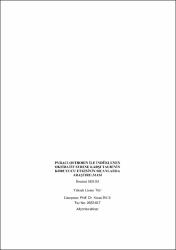Pyraclostrobin ile indüklenen oksidatif strese karşı taurinin koruyucu etkisinin sıçanlarda araştırılması
Abstract
Pyraclostrobin yaygın olarak kullanılan strobilurin türevi bir mantar ilacı olup
organizmada oksidatif stres ve DNA hasarı ile birlikte üreme performansını ve
embriyonal geliĢimi bozmaktadır. Sistein aminoasitinden elde edilen taurin ise
antioksidan, sitoprotektif ve ozmoregülasyon gibi metabolik süreçlerde önemli bir rol
oynamaktadır. Bu çalıĢmada pyraclostrobin verilen erkek sıçanlarda oluĢan oksidatif
strese karĢı taurinin olası koruyucu etkinliğinin belirlenmesi amaçlandı. ÇalıĢmada
Sprague Dawley cinsi sıçanlar her grupta 8 hayvan olacak Ģekilde 6 gruba ayrıldı.
ÇalıĢmada sıçanlara 0.5 ml mısır yağı, 30 mg/kg pyraclostrobin ve 30 mg/kg
pyraclostrobin ile birlikte 50, 100 ve 200 mg/kg taurin gastrik gavaj ile 28 gün
süresince verildi. Pyraclostrobin uygulamasının bazı biyokimyasal parametreler
(aspartat aminotransferaz, alanin aminotransferaz, alkalen fosfataz, kan üre azotu ve
kreatinin) ile malondialdehid düzeylerini artırdığı, aksine glutatyon ve antioksidan
enzim aktivitelerinden süperoksid dismutaz ve katalaz düzeylerinde ise azalma
meydana getirdiği belirlendi. Bununla beraber, pyraclostrobin uygulaması ile
karaciğer dokusunda apoptotik (Bax, Caspase 3, Caspase 8, Caspase 9 ve p53) ve
proinflamatuvar (TNF-α ve NFκB ) genler ile CYP2E1’in mRNA ekspresyon
düzeylerinin arttığı ve antiapoptotik gen olan Bcl-2’nin mRNA ekspresyonun
düzeyinin azaldığı tespit edildi. Ayrıca, pyraclostrobin uygulamasının DNA hasarını
artırdığı ve dokularda ise histopatolojik değiĢiklikler oluĢturduğu gözlendi.
Pyraclostrobin ile birlikte verilen 50, 100 ve 200 mg/kg dozda taurin
uygulamalarının ise pyraclostrobin ile oluĢan değiĢikleri tersine çevirdiği tespit
edildi. Sonuçta taurinin pyraclostrobin ile indüklenen oksidatif hasara karĢı
antioksidan, antiinflamatuvar ve antiapoptotik etkisi ile birlikte sitoprotektif etki
gösterdiği belirlendi. Pyraclostrobin is a widely used strobilurin derivative fungicide and impairs
reproductive performance and embryonal development, together with oxidative stress
and DNA damage in the organism. Taurine, obtained from the amino acid cysteine,
plays an important role in metabolic processes such as antioxidant, cytoprotective,
and osmoregulation. In this study, it was aimed to determine the possible protective
efficacy of taurine against oxidative stress in male rats given pyraclostrobin. In the
study, Sprague Dawley rats were divided into 6 groups with 8 animals in each group.
In the study, rats were given 0.5 ml corn oil, 30 mg/kg pyraclostrobin, and 30 mg/kg
pyraclostrobin with 50, 100, and 200 mg/kg taurine by gastric gavage for 28 days. It
was determined that pyraclostrobin application increased some biochemical
parameters (aspartate aminotransferase, alanine aminotransferase, alkaline
phosphatase, blood urea nitrogen, and creatinine) and malondialdehyde levels, while
on the contrary, it caused a decrease in glutathione and antioxidant enzyme activities
such as superoxide dismutase and catalase levels. Nonetheless, apoptotic (Bax,
Caspase 3, Caspase 8, Caspase 9 and p53) and pro-inflammatory (TNF-α and NFκB)
genes and CYP2E1 mRNA expression levels increased and the antiapoptotic gene
Bcl-2 mRNA expression levels decreased by pyraclostrobin treatment in liver tissue.
Also, it was observed that pyraclostrobin application increased DNA damage and
caused histopathological changes in tissues. It was determined that 50, 100, and 200
mg/kg doses of taurine administered together with pyraclostrobin reversed the
changes caused by pyraclostrobin. As a result, it was determined that taurine had a
cytoprotective effect together with its antioxidant, anti-inflammatory, and anti apoptotic effects against the oxidative damage induced by pyraclostrobin.
Collections
- Yüksek Lisans Tezleri [635]



















